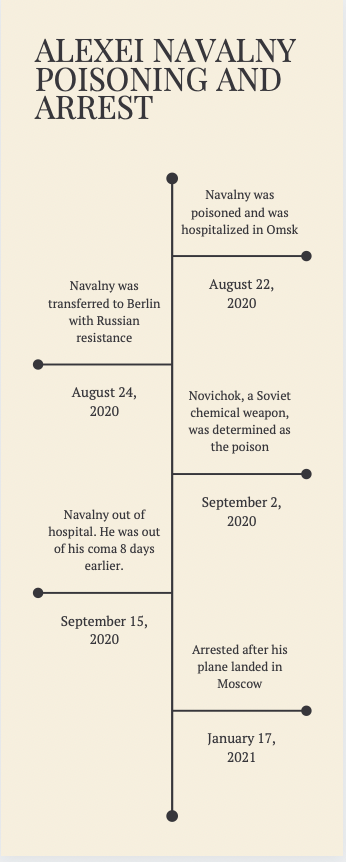Russian opposition leader Navalny arrested
January 18, 2021
Alexei Navalny, a prominent Russian opposition leader, was detained in Russia at Moscow’s Vnukovo airport following an extended stay in Germany after he was poisoned.
Navalny was warned that he would be detained in Russia before he came back.
“I know that I am in the right and that all the criminal cases against me are fabricated,” said Navalny in a statement to reporters before he was detained.
Many believe that this detainment is unjust and a violation of human rights.
“Yes, of course it’s unjust, and of course it violates human rights. But in Russia, they don’t have freedoms like the US. And honestly, Putin has control over everything in Russia so [Navalny] has no chance at all. This is violating ‘natural rights,’ you could say, and it is very unjust if he did not do anything wrong,” said Sean Kadkhodayan (‘23).
Amnesty International stated that Navalny was detained as a prisoner of conscience, or a person who is arrested for peaceful expression of opinion.
“Aleksei Navalny’s arrest is further evidence that Russian authorities are seeking to silence him,” said Natalia Zviagina, Moscow’s Amnesty International Office Director.
The charges set against Navalny were based on allegations for breaching his 2014 embezzlement sentence and suspension.
“Putin is so enraged that I survived his poisoning that he ordered [Federal Prison Service] to go to court and demand that my suspended sentence is changed to a real one,” tweeted Navalny on January 12 with an image of a legal request filed against him.
The 2014 case was deemed by the European Court of Human Rights as arbitrary and was criticized. Navalny claimed that the case was politically motivated.
Some consider this event to be a violation of human rights and freedom of expression. Others remain undecided.
“It is not explicitly a violation of the freedom of speech but it could be implicitly since the original poisoning might be orchestrated by the FSB, but this is disputed by the FSB of course. If this is true, then it is a violation of the freedom of speech, but since the investigation was done by citizen journalists and not federal bureaus, then this remains inconclusive for me,” explained Richard Li (‘22).
Navalny is a tough critic of the Russian government, exposing corruption within the Russian government. He runs a popular blog exposing the corruption of Russian officials, and it is how he came into the spotlight.
Navalny was arrested for 30 days two years ago at an anti-Putin protest after the Russian election.




